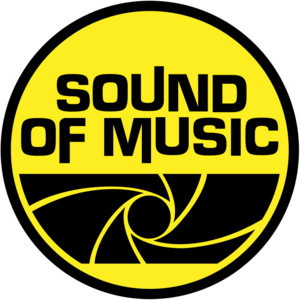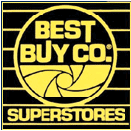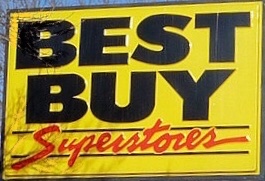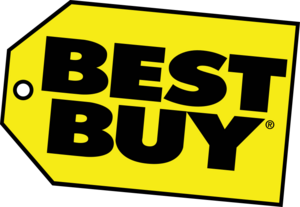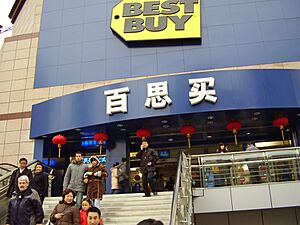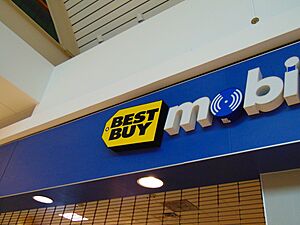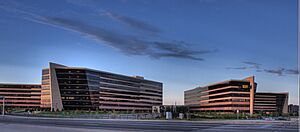Best Buy facts for kids

Logo used since 2018
|
|
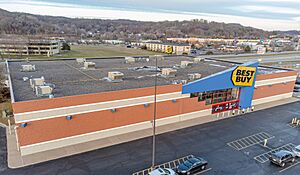
Best Buy store in Onalaska, Wisconsin
|
|
|
Formerly
|
|
|---|---|
| Public | |
| Traded as | |
| Industry | Retail |
| Founded | August 22, 1966 in St. Paul, Minnesota, United States, as Sound of Music |
| Founders |
|
| Headquarters | Richfield, Minnesota,
U.S.
|
|
Number of locations
|
1,117 (2025) |
|
Areas served
|
|
|
Key people
|
|
| Products |
|
| Services | Tech repair |
| Revenue | |
|
Operating income
|
|
| Total assets | |
| Total equity | |
|
Number of employees
|
c. 85,000 (2025) |
| Divisions | Best Buy Canada |
| Subsidiaries |
|
| Footnotes / references Financials as of February 1, 2025[update]. |
|
Best Buy is a big store that sells electronics like TVs, computers, and phones. It also sells home appliances. The company started in 1966 in St. Paul, Minnesota, USA. It was first called Sound of Music and focused on audio equipment.
In 1983, the company changed its name to Best Buy. It started selling more types of electronics. Best Buy has stores in the United States and Canada. It used to have stores in China and Mexico too. Best Buy also owns other companies like Geek Squad, which helps fix computers.
Best Buy is one of the largest electronics stores in the United States. It is a very important company in the retail world.
Contents
How Best Buy Started
The Sound of Music Years
Best Buy began on August 22, 1966. A person named Richard M. Schulze opened an electronics store. It was called Sound of Music. This store sold fancy stereo systems. Schulze used his own money to open the first store.
By 1969, there were three Sound of Music stores. The company grew and made good money. By 1978, there were nine stores in Minnesota.
The "Tornado Sale" Idea
In 1981, a tornado hit one of the biggest Sound of Music stores. The roof was torn off, but many products were safe. Schulze decided to have a "Tornado Sale" in the parking lot. He advertised it by promising "best buys" on everything.
This sale was a huge success! The company made more money in four days than in a whole month. This event gave Schulze an idea for a new way to sell things.
Becoming Best Buy
In 1983, Sound of Music changed its name to Best Buy Company, Inc. There were seven stores at this time. The company started selling home appliances and VCRs. This helped them reach more customers.
Best Buy opened its first "superstore" in Burnsville, Minnesota. This store used the idea from the "Tornado Sale." It sold many items at low prices. This new store was very successful.
In 1985, Best Buy became a public company. This meant people could buy shares of the company. Two years later, its shares were listed on the New York Stock Exchange.
New Store Ideas
In 1988, Best Buy tried a new store design called "Concept II." Stores became brighter and more modern. All products were placed on the sales floor. There were fewer salespeople, and customers could find information themselves.
Best Buy also stopped paying salespeople based on how much they sold. This made shopping more relaxed. At first, some companies like Sony stopped selling their products at Best Buy. But when Best Buy's sales grew, they came back.
By 1992, Best Buy was making $1 billion in sales each year. In 1994, they launched "Concept III" stores. These stores were bigger and had more products. They also had "Answer Center" touchscreens for product info.
In 1998, "Concept IV" stores opened. These had an open layout and products organized by type. Cash registers were placed around the store. Best Buy was added to the S&P 500 list in 1999.
Best Buy in the 2000s
In 2000, Best Buy bought Magnolia Hi-Fi, a store that sold audio and video equipment. In 2001, Best Buy bought Musicland Stores Corporation. This company owned stores like Sam Goody.
Later in 2001, Best Buy bought Future Shop Ltd. in Canada. This was Best Buy's first step into other countries. Future Shop continued to operate on its own.
In 2002, Brad Anderson became the new CEO of Best Buy. He had worked at the company since 1973. Best Buy also bought Geek Squad, a company that fixes computers.
By 2003, Best Buy had over 600 stores in the U.S. They also started a "Reward Zone" program for loyal customers. In 2005, Best Buy stopped using mail-in rebates. Instead, they gave instant discounts.
In 2006, Best Buy bought a big part of Jiangsu Five Star Appliance in China. In 2007, the first Best Buy store opened in Shanghai, China. Best Buy also started selling only digital TVs.
In 2008, Best Buy started selling musical instruments. They also became the first store to sell Apple's iPhone. In December, Best Buy opened its first store in Mexico.
In 2009, Best Buy Mobile stores opened. These stores focused only on mobile phones. Brian J. Dunn became the new CEO of Best Buy. Best Buy also partnered with CinemaNow for online movie streaming.
Best Buy in the 2010s and Beyond
In 2010, Best Buy opened stores in the United Kingdom. However, all these stores closed by 2012. Best Buy also closed its own stores in China by 2011. Its operations there merged with Jiangsu Five Star.
In 2012, Best Buy started a "transformation strategy." Stores were redesigned to be "Connected Stores." They added special sections for brands like Apple and Samsung.
In April 2012, CEO Brian Dunn resigned. Richard Schulze, the founder, also resigned as chairman. In September 2012, Hubert Joly became the new CEO. He made changes like matching prices with other stores. He also made sure employees got more training.
In 2013, Best Buy left the European market. They sold their share in a mobile phone business. Online shopping became more popular in the 2010s. This caused Best Buy's sales to go down for a while.
In 2015, Best Buy closed the Future Shop chain in Canada. Many of these stores became Best Buy locations. In 2018, Best Buy closed its 250 standalone Best Buy Mobile stores in the U.S.
On May 9, 2018, Best Buy showed a new logo. This was the first new logo in almost 30 years. In July 2018, Best Buy reduced the space for physical music. This was because streaming music became very popular.
In April 2019, Corie Barry became the new CEO. She was the company's chief financial officer before this. Hubert Joly became the executive chairman.
In early 2021, Best Buy had to lay off some employees. This happened even though computer sales increased during the COVID-19 pandemic. In August 2022, Best Buy announced more layoffs.
In October 2023, Best Buy said it would stop selling movies and TV shows on physical discs. This is because streaming services are now very popular.
In January 2024, Best Buy announced a new plan for Canada. Some stores called The Source will become "Best Buy Express" stores. These smaller stores will sell Best Buy products.
In January 2025, Best Buy shared plans to bring back its online marketplace. This will allow other sellers to sell products on Best Buy's website.
What Best Buy Sells and Does
Products and Services
Best Buy sells many kinds of electronics. These include TVs, computers, video games, and mobile phones. They also sell home appliances like washing machines and refrigerators. Salespeople at Best Buy do not work on commission. This means they are not paid based on how much they sell.
Best Buy offers services through its Geek Squad brand. Geek Squad helps with computer repair and warranty services. Best Buy also has an online community. Here, customers can ask questions and get answers from other people or experts.
Store Design and Locations
Best Buy stores usually have light brown outside walls. The entrance often looks like a blue box coming out of the building.
As of October 2016, Best Buy had many stores. This included over 1,000 Best Buy stores in the U.S. They also had Best Buy Mobile stores and Pacific Sales stores. Best Buy also had stores in Canada and Mexico.
Best Buy's Own Brands
Best Buy also makes products under its own brand names. These are called "house brands." Some of them include:
- Dynex – Affordable electronics and computer items.
- Init – Storage products like media storage and bags.
- Insignia – Electronics, small appliances, and accessories.
- Magnolia Design Center – Helps design and install home theater systems.
- Magnolia Home Theater – High-end home theater equipment.
- Modal – Stylish mobile accessories like Bluetooth speakers.
- Pacific Sales – High-quality home appliances.
- Platinum – Best quality in-house brand for many products.
- RocketFish – Cables for home theater setup and computer accessories.
- RocketFish Mobile – Phone cases, chargers, and other mobile accessories.
Images for kids
See also
 In Spanish: Best Buy para niños
In Spanish: Best Buy para niños


